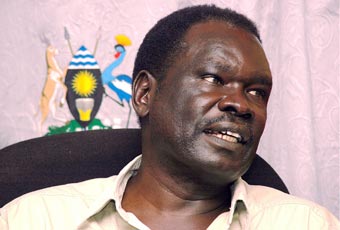
By Jocelyn Edwards
Confronted by MPs at a petroleum governance workshop two weeks ago, Energy Minister Hillary Onek promised to table the Production Sharing Agreements (PSAs) with oil companies the very next Tuesday.When he did not appear in parliament that day, June 22nd, no one was surprised however. Government has been obfuscating and delaying on the contracts for months now.
In response, Rubanda West MP Henry Banyenzaki says the minister was “defying parliament” and threatens to move a motion of displeasure in the minister’s conduct. He is confident he has the support to get the motion through. “The people behind me are very many; they are the whole parliament.”
Banyenzaki’s gesture is unlikely to achieve its desired effect. However, it does indicate that even the government’s own MPs have become frustrated with the extent of the executive’s secrecy and exclusivity on matters related to the oil industry.
Suspicions
In the past, the government has used confidentiality clauses contained in the contracts to justify shielding the documents from public view. However, companies long ago released the government from those clauses, saying they have no problem with the PSAs being made public. Tullow Oil (U) General Manager Brian Glover recently went even farther, suggesting that the documents actually should be released. “As we move closer and closer to production next year, one would like to think that the government would say [it]can make those available,” he said.
With that argument for secrecy gone, it’s hard not to suspect that the government must have other nefarious reason for concealment. The secrecy surrounding PSAs and the industry at large has created a fertile breeding ground for rumour and gossip. “It makes everybody suspicious,” says MP Banyenzaki.
While few dare to voice it in a public forum, the worry on many minds is that certain individuals are already benefiting unethically from the presence of petroleum in the country.
During the battle between Tullow and Italian oil giant, Eni, for Heritage’s shares early this year, rumour was rife that ministers in Museveni’s inner circle were backing various companies and stood to gain from winning favour for their side. A January report by The Times of London that Eni was prepared to offer the government a US$300 million “sweetener” to convince it to approve its purchase of Heritage’s shares seemed to lend some credibility to such rumours.
Now, just when it seemed that all that remained was for the government to dot the i’s and cross the t’s on the sale of Heritage’s assets to Tullow, there is talk among industry insiders that Eni is back in the picture, threatening to torpedo Tullow’s purchase. Certain actors have appeared to again favour Eni, calling the government’s approval of Tullow’s deal into question. “We will approve a company whose market capitalisation is three times the size of the required investment,” Energy Ministry Permanent Secretary Kabagambe Kaliisa said, referring to Eni in the New Vision on June 1.
An article in the New Vision on June 18 seemed to confirm that the Italian company is still interested acquiring oil assets in Uganda. It quoted a company representative as saying that it was prepared to pay US$1.5 billion for Heritage’s shares as well as the taxes that the government is demanding from the smaller company.
Government waffling on the deal again raises the question of what subterranean forces are at play in the tug of war.
Concentration of power
Secrecy over the PSAs and the Heritage sale is part of an overall campaign by the executive to limit the number of people in Uganda involved in the decision making process about petroleum. Since commercial quantities of oil were discovered last year, President Museveni has moved quickly to personalise control over the industry.With his son, Lt. Col. Muhoozi Kainerugaba and his special forces in charge of the oil fields in the west, it’s become almost a family business.
The extent of Museveni’s control became evident when representatives of Eni, Total and CNOOC came to town earlier this year to campaign for entry into the industry.Company officials made their appeals not at the Ministry of Energy but State House. As Dickens Kamugisha, head of the African Institute for Energy Governance in Kampala puts it, “The oil industry is not managed by institutions, it’s managed by individuals on behalf of the President.”
The proposed Petroleum Act Bill, approved by cabinet and due to be presented to parliament in a few weeks, threatens to further the problem of concentration of power over the oil industry. The legislation grants the minister responsible for petroleum control over almost every facet of the industry, from licensing to regulation to calculation of payments due from the companies; almost no checks and balances are placed on his authority.
Since last year’s discoveries of oil, there has been much debate at home and in the foreign press about whether or not the Uganda will be able to avoid the oil curse. As the executive moves to tighten control over the resource and conceal decisions about it from scrutiny that becomes more and more unlikely.
 The Independent Uganda: You get the Truth we Pay the Price
The Independent Uganda: You get the Truth we Pay the Price


